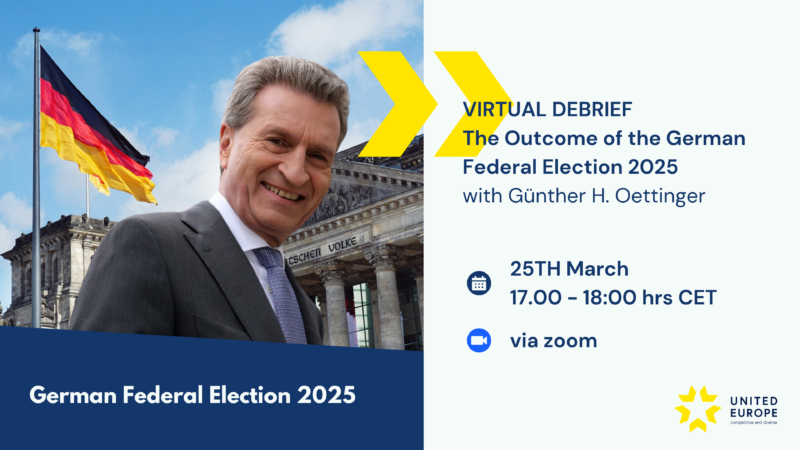On Tuesday, 25th March Günther H. Oettinger, President of United Europe, addressed United Europe members and gave his perspective on the outcome of the German Federal Elections 2025.
Germany’s recent federal election produced a fragmented parliament. The FDP is out, and the AFD has emerged as second-largest faction after the CDU. The only viable governing option was a CDU/CSU/SPD “grand coalition” – no longer “grand” in strength but necessary to form a stable government.
Friedrich Merz, poised to become Chancellor, brings valuable European experience from his time in the European Parliament. His leadership could mark a shift toward using the European framework to boost Germany’s and the EU’s global competitiveness – particularly vis-à-vis China and the US.
Main Challenges Ahead:
- Competitiveness and Economic Growth: Germany needs structural reform, not just budget flexibility. While the outgoing parliament altered the constitution to ease debt restrictions (intended to fund defense and infrastructure), the risk is that access to funding without reform will delay necessary changes to the labor market, industrial and energy policy. Innovation and private investment must be revived if Germany is to reclaim its status as a global industrial leader.
- Migration Policy: Migration remains a divisive issue. Germany, Austria, and the Netherlands bear disproportionate costs due to generous social systems, which continue to attract more migrants than other EU states. A more equitable European asylum and redistribution system is needed, alongside a reassessment of Germany’s own benefit structure.
- Security (Internal, External, Cyber): Defense spending is increasing, but without coordinated European platforms, efficiency is limited. Cooperation on areas like satellite internet and joint procurement is essential. Trust in the US, especially under Trump, is low and Europe urgently needs defense sovereignty.
European Dimension and Foreign Policy
Germany’s relationship with France, and with European leaders like Donald Tusk, must be strengthened. Coordination between Central and Eastern Europe is key. The EU must present a united front on global issues and avoid being divided by external actors like Trump, Putin, or Xi. Trade policy, defense cooperation, and energy are all areas requiring tighter integration.
The disappointing outcome of the last European Council – where Ursula von der Leyen proposed €50 billion in support and only €5 billion was agreed due to Hungary’s veto – highlights internal EU weaknesses: Baltic states and Denmark are investing heavily in Ukraine’s defense, while more distant nations show less urgency. Solidarity in Nato and the EU must not be geographical.
Energy and Industrial Policy
Germany’s past focus on renewables only has led to high energy prices for households and industry. A more pragmatic energy policy is needed, balancing sustainability, supply security and affordability. At the European level, the Green Deal now evolved into a “Clean Industrial Deal”, where competitiveness became central again.
Cautious Optimism or Risky Gamble?
There is growing frustration that reforms always follow money, rather than preceding it. The recent weakening of the debt brake may offer short-term fiscal flexibility, but without parallel reforms, it risks entrenching stagnation. A private four-eyed discussion between Merz and Klingbeil may have included a promise to reform in exchange for budgetary leeway – but that remains to be seen.
In conclusion, Germany stands at a crossroads – its domestic policy, European stance, and global strategy all demand decisive leadership. The question is: Can this coalition deliver?



